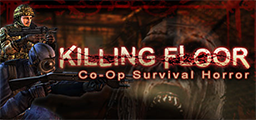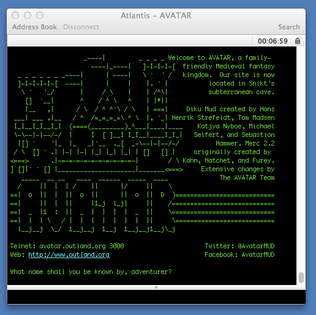A multi-user dungeon, also known as a multi-user dimension or multi-user domain, is a multiplayer real-time virtual world, usually text-based or storyboarded. MUDs combine elements of role-playing games, hack and slash, player versus player, interactive fiction, and online chat. Players can read or view descriptions of rooms, objects, other players, and non-player characters, and perform actions in the virtual world that are typically also described. Players typically interact with each other and the world by typing commands that resemble a natural language, as well as using a character typically called an avatar.

Bullshit Detector was the name of a series of compilation LPs put together by the anarcho-punk band Crass and released on their Crass Records label. Three editions were released between 1980 and 1984, consisting of demo tapes, rough recordings and artwork that had been sent to the band. The sound quality of the Bullshit Detector series was mixed, and was often very basic or poor as Crass would master the tapes directly to record without any additional production or enhancement. For Crass, the expectation of a polished performance was missing the point of the DIY punk ethic:

BatMUD is a medieval fantasy MUD, established in 1990. BatMUD is Finland-based and operated and owned by a non-profit organization, Balanced Alternative Techniques ry, officially registered 1994 in Helsinki, Finland.
DikuMUD is a multiplayer text-based role-playing game, which is a type of multi-user domain (MUD). It was written in 1990 and 1991 by Sebastian Hammer, Tom Madsen, Katja Nyboe, Michael Seifert, and Hans Henrik Stærfeldt at DIKU —the department of computer science at the University of Copenhagen in Copenhagen, Denmark.

Ancient Anguish, abbreviated AA, is a fantasy-themed MUD, a text-based online role-playing game. Founded in 1991 by Balz "Zor" Meierhans and Olivier "Drake" Maquelin, it opened to the public on February 2, 1992. It is free-to-play, but has been supported by player donations since 1994.

Discworld MUD is a popular MUD, a text-based online role-playing game, set in the Discworld as depicted in the Discworld series of books by Terry Pratchett.
Player versus player (PvP) is a type of multiplayer interactive conflict within a game between human players. This is often compared to player versus environment (PvE), in which the game itself controls its players' opponents. The terms are most often used in games where both activities exist, particularly MMORPGs, MUDs, and other role-playing video games, to distinguish between gamemodes. PvP can be broadly used to describe any game, or aspect of a game, where players compete against each other. PvP is often controversial when used in role-playing games. In most cases, there are vast differences in abilities between players. PvP can even encourage experienced players to immediately attack and kill inexperienced players. PvP is often referred to as player killing in the cases of games which contain, but do not focus on, such interaction.
LPMud, abbreviated LP, is a family of multi-user dungeon (MUD) server software. Its first instance, the original LPMud game driver, was developed in 1989 by Lars Pensjö. LPMud was innovative in its separation of the MUD infrastructure into a virtual machine and a development framework written in the programming language LPC.
An online text-based role playing game is a role-playing game played online using a solely text-based interface. Online text-based role playing games date to 1978, with the creation of MUD1, which began the MUD heritage that culminates in today's MMORPGs. Some online-text based role playing games are video games, but some are organized and played entirely by humans through text-based communication. Over the years, games have used TELNET, internet forums, IRC, email and social networking websites as their media.
A mob, short for mobile or mobile object, is a computer-controlled non-player character (NPC) in a video game such as an MMORPG or MUD. Depending on context, every and any such character in a game may be considered to be a "mob", or usage of the term may be limited to hostile NPCs and/or NPCs vulnerable to attack.

Brain Warp is an electronic audio game which prototypes were invented by Big Monster Toys, and its final game production was manufactured and published by Tiger Electronics and released on June 16, 1996. In this game, players follow the spoken instructions from sound files spoken from the game unit. The player has to rotate the game in different directions so that the correct color is facing upwards. Its catchphrase which the voice says before a game begins is: "If you don't keep up with me, you're finished!". When you fail a game, the game unit will say "this game is finished" and then it will say "wanna warp again?". A Star Wars version titled Death Star Escape was released by Tiger Electronics in 1997 and the games are called Challenges.

Killing Floor is a cooperative first-person shooter video game developed and published by Tripwire Interactive. It was originally released as an Unreal Tournament 2004 mod in 2005. A full retail release followed on May 14, 2009, for Microsoft Windows, and for OS X on May 5, 2010. The Linux version was released via Steam in November 2012.

Lost Souls is a MUD, a text-based online role-playing game set in a medieval fantasy world. It has an extensive history of technical innovation in its field and has received critical praise.
DGD, Dworkin's Game Driver, is an LPMud server written by Felix A. "Dworkin" Croes. DGD pioneered important technical innovations in MUDs, particularly disk-based object storage, full world persistence, separation of concerns between driver and mudlib, runtime morphism, automatic garbage collection, lightweight objects and LPC-to-C compilation.

Xyllomer is a MUD, a text-based online role-playing game, founded in 1991 as PaderMUD. It was the first publicly accessible MUD to use Dworkin's Game Driver. It has been hosted in Germany throughout its history.
MorgenGrauen, abbreviated MG, is a German-language MUD, a text-based online role-playing game, founded in 1992 and opened to the public in 1993. It is noted as popular in the MUD world, described at times as having an average of around 100 players online per day, with some days seeing 220 players. It bills itself, and has been noted by others, as the world's largest German-speaking MUD.

3Kingdoms, abbreviated 3K, is a MUD, a text-based online role-playing game, founded in 1992.

A.V.A.T.A.R. MUD is a free, online, massively multiplayer, fantasy, text-based role-playing game, set in a real-time virtual environment. It combines elements of role-playing games, hack and slash style computer games, adventure games and social gaming.

Fast Five is a racing video game developed and published by Gameloft for Android, iOS, J2ME and MacOS. The game is based on the fifth film of the Fast & Furious franchise. It was released in two versions: 3D for smartphones and 2D for functional phones.
This is a glossary of terms common in multi-user dungeon (MUD) multiplayer virtual worlds.









